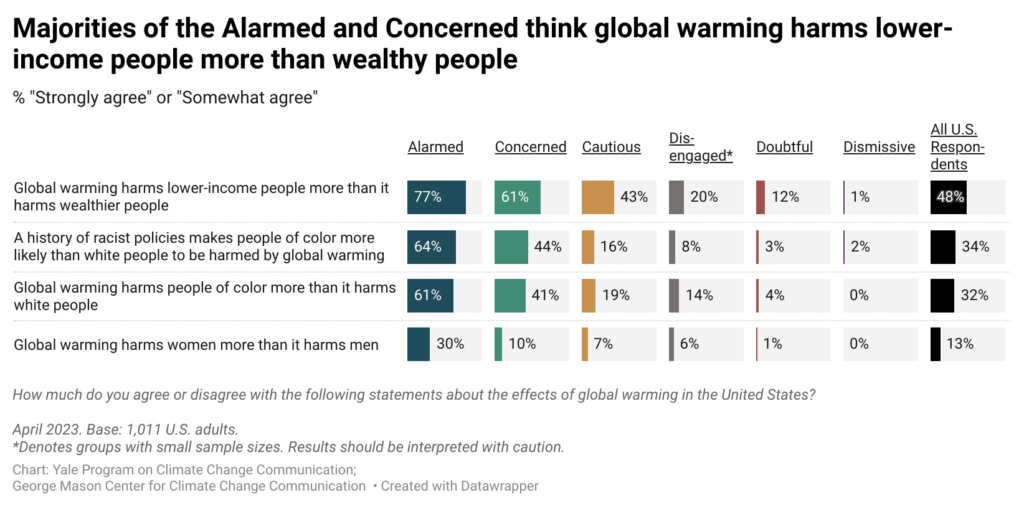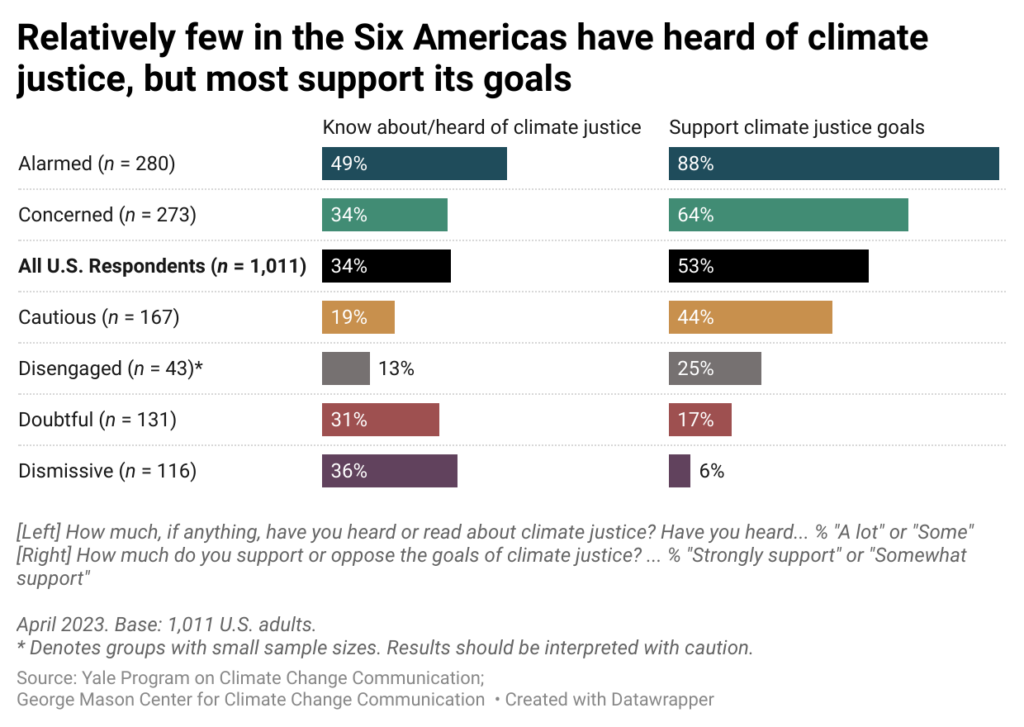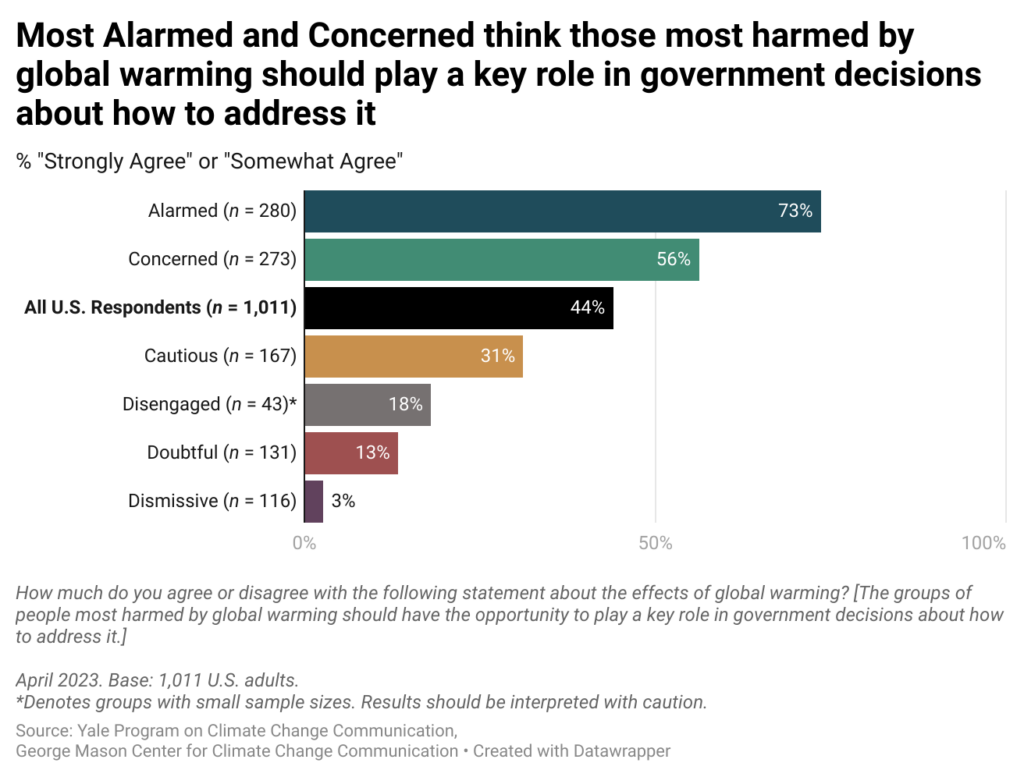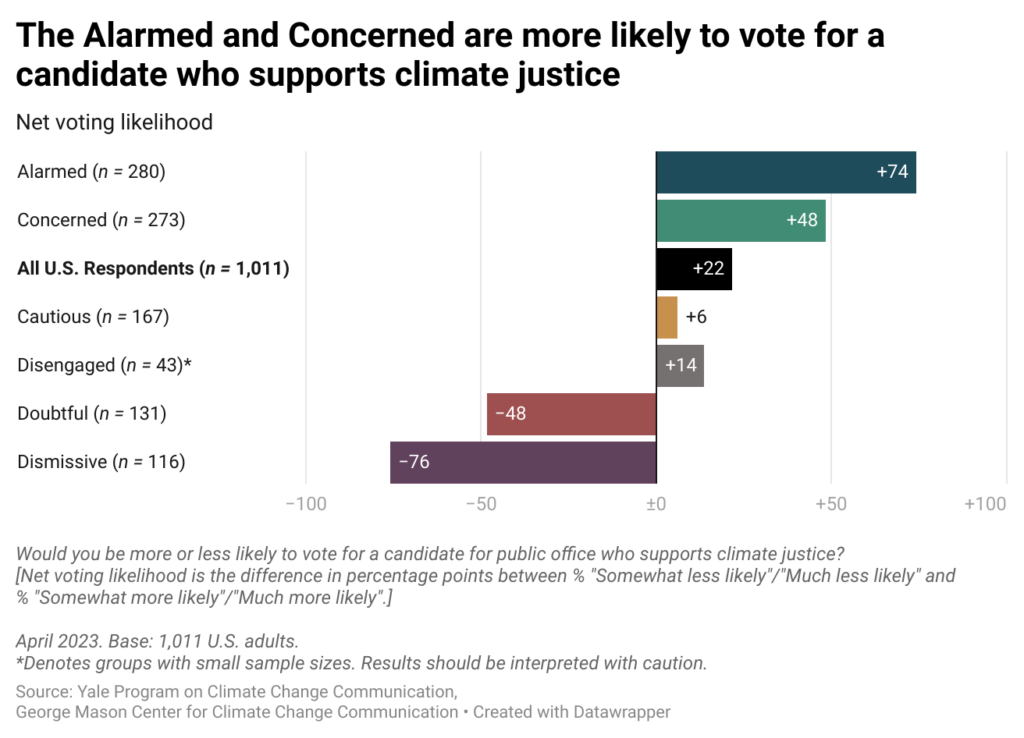Climate Note · Jan 17, 2024
Support for climate justice across Global Warming’s Six Americas
By Jennifer Carman, Leah Ndumi Kioko, Matthew Ballew, Marija Verner, Danning (Leilani) Lu, Joshua Low, Seth Rosenthal, Edward Maibach, John Kotcher, Saad Amer, Jennifer Marlon and Anthony Leiserowitz
Filed under: Audiences, Beliefs & Attitudes and Policy & Politics
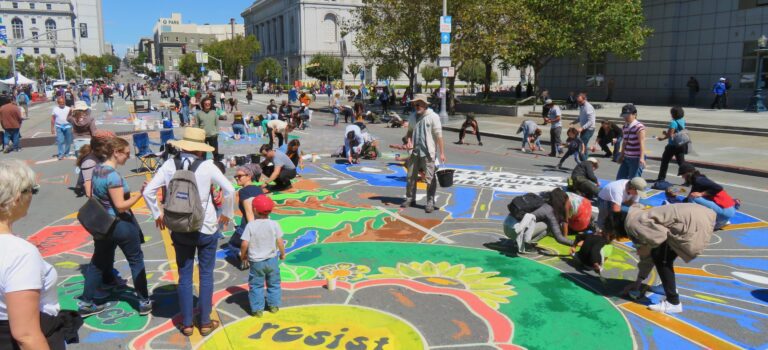
Climate justice is an essential component of addressing climate change. The groups and nations that have historically contributed least to the causes of climate change are experiencing the most harm from it. These harms, in turn, often make existing challenges even worse, including those based on personal factors (such as age or health issues) and social factors (such as systemic racism and poverty). Finally, communities that face greater harm are also often excluded from the decision-making process, resulting in climate solutions that can disproportionately benefit people who are less impacted.
The goals of climate justice include reducing the unequal harms of climate change, providing equitable benefits from climate solutions, and involving affected communities in decision-making. Climate justice has become an integral part of the climate movement in the United States and worldwide, and has become part of climate change decision-making and advocacy from the local to the global level, including in the recent negotiations at the 28th United Nations Conference of Parties (COP28). However, many commitments to climate justice remain limited. For example, wealthy nations’ current contributions to the United Nations’ “loss and damage fund” – which will provide aid to those nations most vulnerable and impacted by climate change – will meet less than 0.5% of estimated needs.
In this Climate Note, we use data from the Climate Change in the American Mind survey of adults (18+) in the United States (April, 2023; n = 1,011) to investigate their recognition of climate injustice and support for climate justice. We examine opinions across Global Warming’s Six Americas – a framework for understanding the spectrum of Americans’ attitudes about global warming. The Alarmed and Concerned segments (who make up 56% of the U.S. population) are most likely to think that global warming is happening and are the most worried about it. By contrast, the Doubtful and Dismissive (who make up 23% of the U.S. population) are the least likely to think that global warming is happening and are the least worried about it. For more information about Global Warming’s Six Americas, see our recently published Climate Note.
Results
Recognition of Climate Injustice Across the Six Americas
Overall, the Six Americas audiences most concerned about global warming – the Alarmed and Concerned – are also the most likely to think it impacts people unequally. While about half of all adults in the U.S. (48%) think that global warming harms lower-income people more than it harms wealthier people, majorities of the Alarmed (77%) and Concerned (61%) think so. Fewer in the other Six Americas audiences think so (43% of the Cautious, 12% of the Doubtful, and 1% of the Dismissive).
About one-third of U.S. adults think that global warming harms people of color more than white people (32%) or that a history of racist policies has made people of color more likely to be harmed by global warming (34%). By contrast, a majority of the Alarmed think that global warming harms people of color more than white people (61%) and that a history of racist policies has made people of color more likely to be harmed (64%). About four in ten of the Concerned think that people of color are harmed more by global warming in general (41%) and due to a history of racist policies (44%), but fewer of the other four Six Americas audiences think so.
Finally, relatively few people in the U.S. overall or across the Six Americas think that global warming harms women more than men. Only 13% of all Americans say global warming harms women more than men, and even among the Alarmed, only three in ten (30%) think so. This percentage falls to one in ten or less among the other five audiences.
Support for Climate Justice Across the Six Americas
While relatively few Americans overall say they have heard about climate justice (34%), many more people support its goals after learning about themThe definition read to respondents was: “Climate justice refers to the idea that global warming affects everyone, but certain communities are harmed more than others, especially low-income communities and communities of color. The goals of climate justice are to reduce these unequal harms, include these communities in decision-making, and ensure they receive a fair share of the benefits of climate action (such as good jobs, cleaner air and water, better health, etc.).” (53%). This pattern was also present among the audiences who are more worried about climate change – the Alarmed (49% heard of versus 88% support), Concerned (34% heard of; 64% support), and even many of the Cautious (19% heard of; 44% support). By contrast, few of the Doubtful or Dismissive support climate justice, with more respondents saying they had heard of climate justice than support it (31% heard of it versus 17% support among the Doubtful, and 36% heard of it versus 6% support among the Dismissive).
While 44% of Americans overall think that the groups most harmed by global warming should have the opportunity to play a key role in government decisions and how to address it, majorities of the Alarmed (73%) and the Concerned (56%) say so. In contrast, fewer within the other Six Americas, including the Cautious (31%), Doubtful (13%) and Dismissive (3%) think the groups most harmed by global warming should have the opportunity to play a key role in government decisions about how to address it.
Finally, when asked whether they would be more or less likely to vote for a candidate for public office who supports climate justice, more Americans overall said they would be more likely (43%) than less likely (21%; a +22 percentage point net likelihood). Large net percentages of the Alarmed and Concerned also said they are more likely to vote for a candidate who supports climate justice (+74 of the Alarmed and +48 of the Concerned). Net voting likelihood was smaller, but still positive, for the Cautious (+6). The Doubtful and Dismissive were much less likely to vote for a candidate who supports climate justice (-48 net likelihood for the Doubtful and -76 for the Dismissive). However, the Doubtful and Dismissive are a much smaller percentage of the U.S. overall (23% in Fall 2023) when compared with the Alarmed and Concerned (56%).
Takeaways
As might be expected, recognition of climate injustice and support for climate justice goals varies greatly across the Six Americas. The Alarmed, followed by the Concerned, are the most likely to think global warming harms some groups more than others, to support climate justice goals, and to vote for pro-climate justice candidates. The Alarmed are especially supportive, with solid majorities recognizing unequal harms based on income and race, and nearly nine in ten supporting climate justice goals. Conversely, the Doubtful and Dismissive are the least likely to recognize existing climate injustice, or to support climate justice.
Overall, results show that the audiences that are most worried about climate change are also the most supportive of policies that will advance climate justice. Because most Americans are Alarmed or Concerned (56%) about climate change, this suggests that the potential number of climate justice supporters is substantial.
Despite high levels of support among the Alarmed and Concerned, current awareness of climate justice among these groups is relatively low. Our recent research found similar gaps between awareness of and support for climate justice among adults in the U.S. who are Black, Hispanic/Latino, women, or who have lower incomes. Moreover, most of the Alarmed and many of the Concerned recognize that global warming disproportionately harms people based on income and race, but few recognize that global warming also disproportionately harms women.
Therefore, creating awareness of climate justice concepts and solutions among the Alarmed and Concerned should be a high priority among climate communicators and organizers. One important way to do so is by working with trusted messengers to connect local events to broader concepts of climate justice and injustice. These efforts can broaden the coalition necessary for building public and political will for climate action, and climate justice.
Further Reading from Yale Climate Connections
- What is ‘climate justice’?
- Interview: The link between racist housing policies of the past and the climate risks of today
- Report card: Biden’s accomplishments on climate justice (June 2023)
Methods
This research is based on findings from a nationally representative survey – Climate Change in the American Mind – conducted jointly by the Yale Program on Climate Change Communication and the George Mason University Center for Climate Change Communication. Interview dates: April 18 – May 1, 2023. Interviews: 1,011 adults (18+). Average margin of error for all respondents: +/- 3 percentage points at the 95% confidence level.
The audience segmentation analysis used the Six Americas Super Short Survey (SASSY) tool. Data were weighted to align with demographic parameters in the United States.
The survey questions included in this report were developed in partnership with climate justice organizations and practitioners in the United States and Canada. Organizations and individuals who contributed to question development are listed in alphabetical order by organization:
- Digital Climate Coalition (Andrea Aguilar, Sha Merirei Ongelungel, Karina Sahlin, and Cristian Sanchez)
- Green Latinos (Irene Burga and Mark Magaña)
- Justice Environment (Saad Amer)
- Mississippi Communities United for Prosperity (Romona Taylor Williams)
- Neighbours United (Montana Burgess)
- Sierra Club (Grace McRae and Makeda Fekede)
- WE ACT for Environmental Justice (Manuel Salgado and Annika Larson)
- Yale Center for Environmental Justice (Kristin Barendregt-Ludwig, Michel Gelobter, and Gerald Torres)
The average margins of error at the 95% confidence interval for the Six Americas:
- Alarmed (+/ 6 percentage points)
- Concerned (+/ 6 percentage points)
- Cautious (+/ 8 percentage points)
- Disengaged (+/ 14 percentage points)
- Doubtful (+/ 9 percentage points)
- Dismissive (+/ 9 percentage points)
